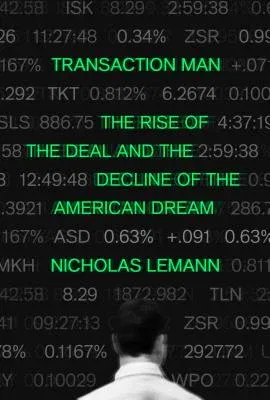An Amazon Best History Book of 2019
A splendid and beautifully written illustration of the tremendous
importance public policy has for the daily lives of ordinary people.
--Ryan Cooper, Washington Monthly
Over the last generation, the United States has undergone seismic
changes. Stable institutions have given way to frictionless
transactions, which are celebrated no matter what collateral damage they
generate. The concentration of great wealth has coincided with the
fraying of social ties and the rise of inequality. How did all this come
about?
In Transaction Man, Nicholas Lemann explains the United States'--and
the world's--great transformation by examining three remarkable
individuals who epitomized and helped create their eras. Adolf Berle,
Franklin Delano Roosevelt's chief theorist of the economy, imagined a
society dominated by large corporations, which a newly powerful federal
government had forced to become benign and stable institutions,
contributing to the public good by offering stable employment and
generous pensions. By the 1970s, the corporations' large stockholders
grew restive under this regime, and their chief theoretician, Harvard
Business School's Michael Jensen, insisted that firms should maximize
shareholder value, whatever the consequences. Today, Silicon Valley
titans such as the LinkedIn cofounder and venture capitalist Reid
Hoffman hope "networks" can reknit our social fabric.
Lemann interweaves these fresh and vivid profiles with a history of the
Morgan Stanley investment bank from the 1930s through the financial
crisis of 2008, while also tracking the rise and fall of a working-class
Chicago neighborhood and the family-run car dealerships at its heart.
Incisive and sweeping, Transaction Man is the definitive account of
the reengineering of America and the enormous impact it has had on us
all.

